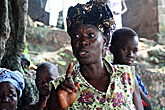Fambul Tok in Sierra Leone

This initiative addresses local legacies of the conflict in Sierra Leone which the Special Court for Sierra Leone and the Truth and Reconciliation Commission, whatever their wider achievements, have been unable to tackle.
ABOUT US
Fambul Tok (Krio for Family Talk) is a community-owned and led organisation, founded on principles of constant consultation and dialogue, that has been promoting reconciliation across five districts of Sierra Leone since 2008. We now have over two thousand volunteers working with us at community-level, with a small number of district and national staff providing support.
The organisation revives and builds upon traditional forms of mediation and conflict resolution, including through bonfire ceremonies that often bring together victims and perpetrators, with the latter confessing before the entire community how they have wronged their victims. They seek - and, on many occasions, receive - forgiveness.
These processes, along with other aspects of the organisation’s follow-up work, help to create a foundation upon which those individuals and their communities can build a better future. In doing so, Fambul Tok is addressing local legacies of the conflict in Sierra Leone which the Special Court for Sierra Leone and the Truth and Reconciliation Commission, whatever their wider achievements, have been unable to tackle. We believe that addressing these local legacies is absolutely vital to building a sustainable peace in Sierra Leone. There is also growing evidence that community involvement in Fambul Tok processes is contributing significantly to improved development outcomes within those communities.
IDENTIFYING THE CHALLENGE
Our purpose here is not to go into lots of detail about us, or our work. You can find out more by checking out our website.
Until now, while seeking at all times to respond to the views of our constituencies at community-level, at board and national level we have been organised in a more ‘conventional NGO’ way. For example, we do not have clear and consistent structures in place to ensure that national-level decisions really do reflect the views of Fambul Tok communities; nor have these communities had any say so far about who should be on the board.
For these sorts of reasons, we believe that we have more work to do to ensure that we reflect our commitment to organisational democracy all the way from top to bottom.
So, we are beginning a process of consultation, internally and beyond, about changes to our organisational structures and processes.
One major proposal being floated is to establish an annual ‘General Assembly’ of the organisation, to which Fambul Tok communities would send representatives. At the general assembly, key decisions about the direction of the organisation would be taken. Its first task could be to draft and approve the organisation’s new constitution. Ultimately, this general assembly might even decide the membership of the board.
There are a host of linked issues and dilemmas that might flow from any decision to establish such a deliberative body. Would the general assembly take decisions only by consensus, as has been our approach to decision-making to date? Would there be a need for a concept of ‘sufficient consensus’? If so, what might that mean? How long should a person’s term on the general assembly be? Should there be powers of recall if members of the general assembly lose the confidence of those they represent?
These are the sorts of questions with which we will be wrestling if we do move in the direction we are considering. We have produced an initial discussion paper that goes into greater detail about our preliminary thinking. Please do contact us if you would like to see a copy of it.
WE NEED YOUR ADVICE
As we begin our internal consultations about how best to deepen our organisational democracy, we are acutely aware that thousands of other organisations across Africa (and the rest of the world, for that matter) have wrestled with this question in the past and continue to do so now.
We know that this will not be an easy path to take. But if we can avoid making mistakes others have already made, it will at least free us up to make some new ones!
This is why, with the help of Pambazuka News, we are today launching this Pan-African consultation, which will run until 30 April 2012.
We would benefit enormously from any advice that you can give us. Long and detailed responses would be wonderful, but we know how busy the activists and intellectuals that read Pambazuka News are, so we certainly don’t expect long tracts.
Quality matters more to us than quantity. Even a couple of sentences to say ‘watch out for this problem’, or, ‘do not try x or y, it just won’t work’, could make a big difference in persuading us to pause, reflect and perhaps change course before it is too late! We will also respect your confidentiality if any advice is provided on this basis.
It is highly likely that a lot of the feedback will be useful to other organisations across Africa too. Pambabuka News and Fambul Tok pledge to publish a detailed report back at the end of the consultation.
One last thing: In the end, Fambul Tok will have to make its own decisions and live with the consequences, good or bad. We promise that we will not hold you responsible for our actions.
Please send your comments to fambultok, writing ‘Pan-African Consultation’ plus your name – and, if applicable, the name of your organisation – in the subject line. You should also feel free to contact us if you have any questions about us.
We look forward to hearing from you – and thanks!
BROUGHT TO YOU BY PAMBAZUKA NEWS.
* Please do not take Pambazuka for granted! Become a Friend of Pambazuka NOW and help keep Pambazuka FREE and INDEPENDENT! Pambazuka Friends.
*John Caulker is the executive director of Fambul Tok.
* Please send comments to editor[at]pambazuka[dot]org or comment online at Pambazuka News.
